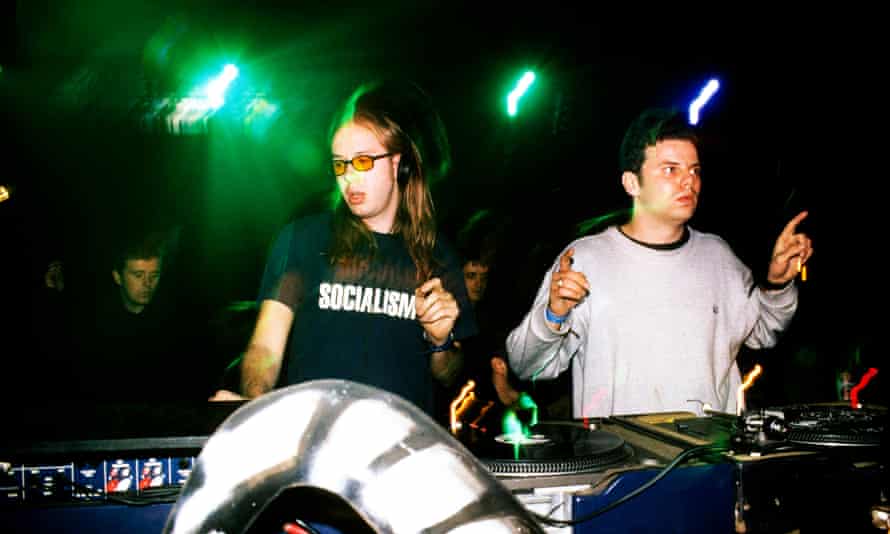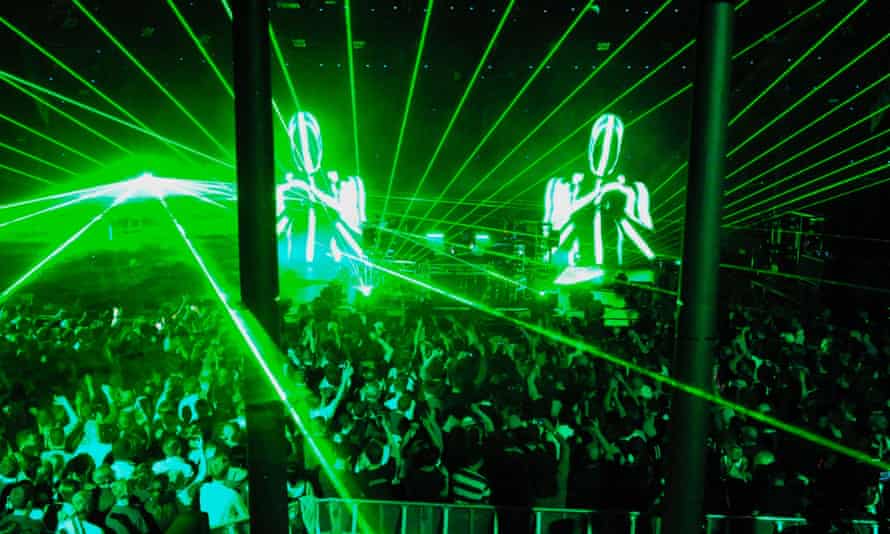Where Was Chemical Brothers Do It Again Filmed
I n a west London pub on a Wednesday lunchtime, the Chemical Brothers are taking a break from preparing for the smallest DJ gig of their recent careers. 20-vii years since they began playing records together as students in Manchester, under the unfortunate and curt-lived pseudonym the 237 Turbo Nutters, Tom Rowlands and Ed Simons' forays into DJing commonly take identify on the grand scale of their spectacular festival headline sets. Such huge gigs have become useful circumstances for road-testing new cloth: the pair knew they were on to a winner with Eve of Destruction – the bizarrely effective alloy of apocalyptic 2019 paranoia, early Chicago house and disco samples that opens their new anthology, No Geography – after playing an early on version to a vast oversupply in Europe. "We're e'er searching," every bit Rowlands puts it, "for that feeling of intensity and … waaaaah!"
Just, in a few days' time, they are returning to their roots: the days when, Simons says, "we would exist crammed in a tiny berth with people everywhere, no barrier, then people would merely wander in and outset cheering and screaming at you". They are DJing for a thousand full of 250 people at the Social, the key London bar/venue run past the record characterization Heavenly. As part of the efforts to save the venue – then under threat from rising rents – they offered to play the same kind of set they played 25 years ago at the Sunday Social, the hugely influential club night also run by Heavenly, in the basement of the Albany pub on nearby Great Portland Street, where the pair were resident DJs. The preparations have brought their ain challenges. "I've been going through the sometime record numberless that we used at the time, pulling out a 12in, then going to digitise it so we can play it again and finding I can't considering the record'south literally got a kick impress beyond it," says Rowlands, frowning.
In fairness, the Sunday Social was very much the kind of club nighttime where the resident DJs' records might become trampled on. It was open for only a few weeks in the autumn of 1994, but quickly gained a reputation as a bastion of unruly hedonism in an era when British clubbing was becoming ever-more polished and professional person. That was the year that Ministry building of Sound and Cream began turning themselves into "superclubs"/lifestyle brands that went on to flog everything from clothing lines to fitness videos and hi-fi equipment. Past contrast, the Sunday Social felt like chaos, a club where Tricky turned upward to play a fix that seemed to primarily consist of heavy metal records at the wrong speed, and a meaning proportion of the clientele looked like they hadn't slept all weekend.
It looms large in Chemical Brothers folklore. When the guild opened, the pair had already fabricated a handful of acclaimed singles under the proper noun the Grit Brothers, a pseudonym they had pinched from a product duo who worked with the Beastie Boys (working on the principle that they were never going to become successful enough for their US counterparts to find). By the fourth dimension it airtight, they were something of a cause celebre, largely as a result of the music they played, which seemed to suspension every rule of an increasingly regimented, genre-specific trip the light fantastic toe scene. Hip-hop was juxtaposed with the Beatles, the intense acid techno of Emmanuel Top's Lobotomie was played aslope the lush 70s soul of Love Unlimited and the dark would invariably cease with the Specials' You're Wondering Now.
"We were putting together something that, in London, was quite new at the fourth dimension," remembers Simons. "A lot of records we'd been playing in Manchester when we were students – yous know, the 2d instrumental runway on the B-side of a hip-hop single, mixed in with techno. So, at the aforementioned time, we were making our own music, we were in the studio recording our debut anthology, we were pretty much doing a remix every week. It felt like a bit of an onslaught. It'south quite emotional to revisit it."

The Sunday Social's distance from the clubbing mainstream was demonstrated when the duo attempted to have the audio to Ibiza. "It was on the terrace at Space at 9am in the morning time, and the oversupply were like: 'Please make this get away.' Nosotros were asked to leave afterward nigh half an hour of … dope beats," Simons says, smile.
"We'd spent ages working it out," says Rowlands. "'This will be amazing, playing Barry White and stuff at 9 o'clock on a Sunday morning, outdoors' – and people were crying, literally crying considering they hated it so much. I remember ane girl, just in tears, going and getting the manager, and him saying: 'You take to finish now.'"
It is clearly many years since a Chemical Brothers DJ set reduced anyone to tears of impotent rage. Over the intervening decades, they have sold millions of records, get used to their albums entering the UK charts at No ane, won four Grammys and fatigued what is reputed to be the biggest crowd in the history of the Glastonbury festival. They have turned from greatly reticent live performers – "We weren't the sort of people that would exist queuing upwardly to audition for the school play," notes Simons – into one of the biggest live draws in dance music. The vast son-et-lumière show they initially devised with longstanding collaborator Adam Smith "as a sort of Velvet Hole-and-corner affair to hide the fact that we were a bit cocky-witting", says Simons, has been the subject of a film, 2012'southward heart-popping Don't Think. It was fairly evidently an influence on the extravagant stage presentations of America's EDM artists, a state of affairs almost which the pair seem equivocal.
"Dance music and clubbing could seem quite countercultural, like you were doing something a bit dissimilar, getting in touch with people and being around people you might not be with all the fourth dimension," says Simons. "Sometimes you lot run into pictures of what's happening in Las Vegas, Electrical Daisy or whatever, and it does look quite monocultural, part of the 1%, and so I think that feels quite dissimilar. You didn't really have to pay to go to the quondam orbital raves – I mean, there was a nominal ticket organisation, but y'all really just tipped up, so that meant there was quite a dissimilar spread of people in that location. That definitely has changed."
Information technology all feels a long style away from DJing in the basement of a pub, but the testify at the Social isn't the only reason the duo accept recently found themselves thinking virtually the early on phase of their career. No Geography was recorded using more than or less the same equipment as Exit Planet Dust, the debut album they were working on during their Sunday Social residency.
"It wasn't a plan – 'Nosotros're only going to do this with erstwhile-fashioned things'," says Rowland. "It was but fun to be in that 94-era machine expanse – where the restrictions are liberating. A lot of our records are made by shunting things together, which meant something interesting came out of it. At present technology means y'all can practically make anything fit with anything. Whereas and so, it would exist more like you go a weird place in the middle where two or three things are meeting. They're not quite in correct, they're not quite in tune, only the sound they're making is more interesting than something pristine. It'south so easy to brand a good record that sounds similar another tape now."

"You get in danger of adjoining on a White Stripes ideology," smiles Simons. "But when you listen to an old acrid firm record, there's such a weird minimal sound, it's then heavy, it could make a whole room vibrate. At present, there's records that automatically button the button for 'this is amazing' – they've got a good groove, the sounds are great and well-baked, simply it's so far away from that kind of weird, advanced texture."
No Geography also sounds remarkably angry. A runway called MAH samples Peter Finch'due south spoken language from the 1976 motion picture Network, in which he attempts to galvanise Television set viewers to open up their windows and scream that they're "not going to have it whatsoever more". The title track features the US poet Michael Brownstein discussing the need for a lack of boundaries between nations. You don't accept to be a genius in decoding the semantics of dance music to work out that information technology'due south an album made in the shadow of Brexit. "The record wasn't fabricated in a vacuum, nosotros didn't retreat from the world to make information technology," says Rowlands. "Even musicians like us who are not writing in an explicit way about what they feel, everything you lot do is impacted by how you feel and every creative choice you make is manifestly influenced, subconsciously or consciously, by what's going on in the world."
"With Brexit, there's the aspect of losing something you're used to having – your rights, whether y'all use them or not – and for what?" says Simons. "There's no trade-off, which makes me quite angry and distressing. Y'all're going to accept something reduced about your country and your own personal opportunities, and that's being celebrated? It's maddening. I think Brexit hits into something almost collaboration, this sense of we tin do it together. Whatever happens with Brexit, whether it happens or it doesn't happen, the European Medicines Bureau has at present left Great britain, it's non coming back to London, that'southward gone. The idea that we are at the centre of people collaborating to make meliorate medicine, that's gone. It's really sad. Anyway," he says, drawing the conversation to a close, "that'due south my little Brexit bluster for the day."
A calendar week afterward, at the Social, the Chemical Brothers find themselves again crammed into a tiny DJ berth, surrounded by people screaming and auspicious. They play tracks from No Geography mixed in with the kind of records that caused pandemonium on the Sun Social'due south dancefloor: Eric B and Rakim alongside the Beatles' Tomorrow Never Knows, their own early on remixes of the Prodigy and Bomb the Bass next to Jeff Perry'southward northern soul anthem Love Don't Come No Stronger. The room is packed, the atmosphere charged. The affair is, says Simons, it'southward non merely nigh the threat faced by the Social. It'southward also about what that symbolises about the way the world has changed, in an era of social media and everything delivered to your door at the click of a button.
"Office of being in a ring is the sense of getting people out of the firm. I feel like motility and existence together is something that is declining. For me, growing up, dance music was a style to socialise. It'southward how I found Tom, it'southward how I found a lot of friends, a sense of customs. It was nigh creating something that brings people out, that brings people together. Loneliness is difficult, it'southward a real struggle for people now. When I used to get to raves, I felt a real sense of belonging, dancing on a phase with people I would never see in my day-to-day life. People tin be dismissive of all that, simply information technology'southward really liberating."
Source: https://www.theguardian.com/music/2019/apr/18/the-chemical-brothers-people-were-crying-because-they-hated-us-so-much
0 Response to "Where Was Chemical Brothers Do It Again Filmed"
Post a Comment